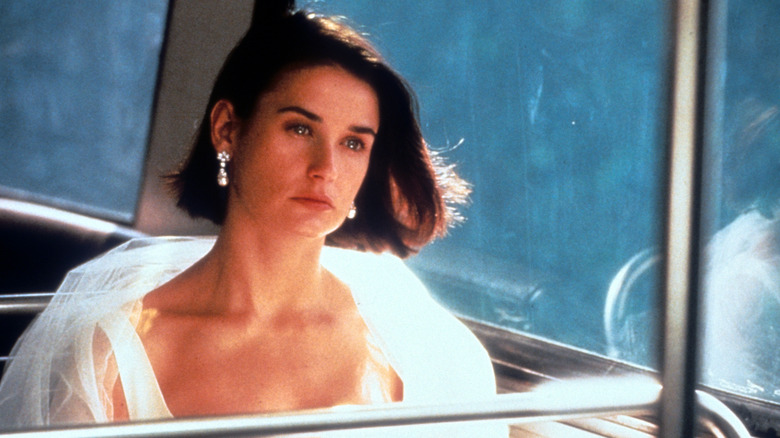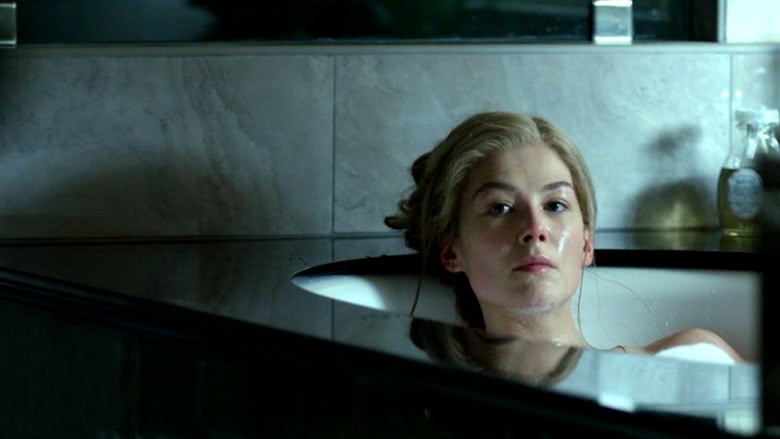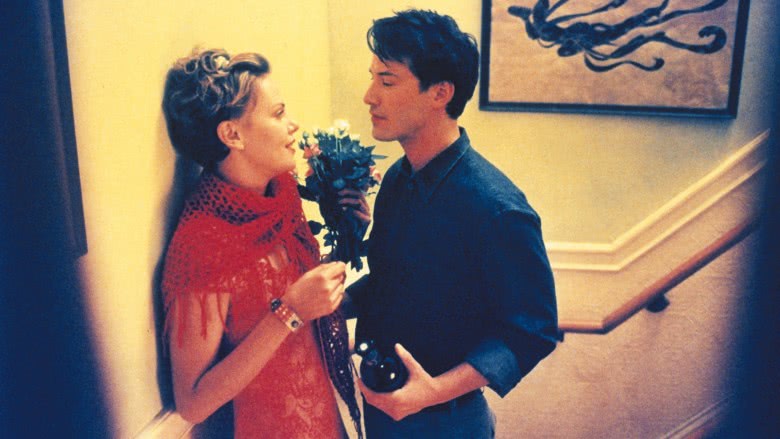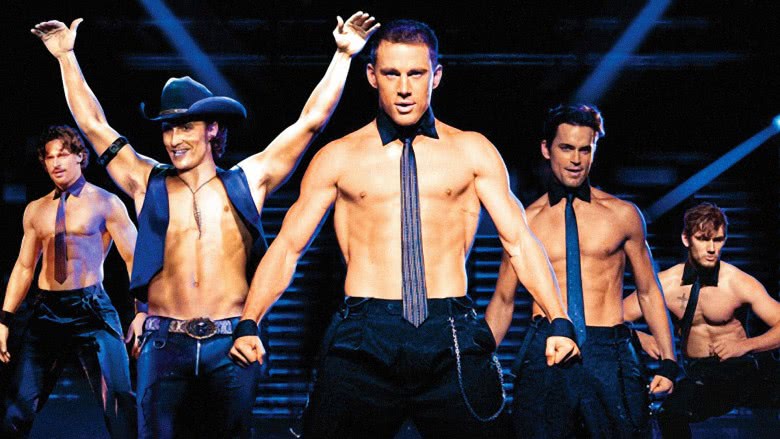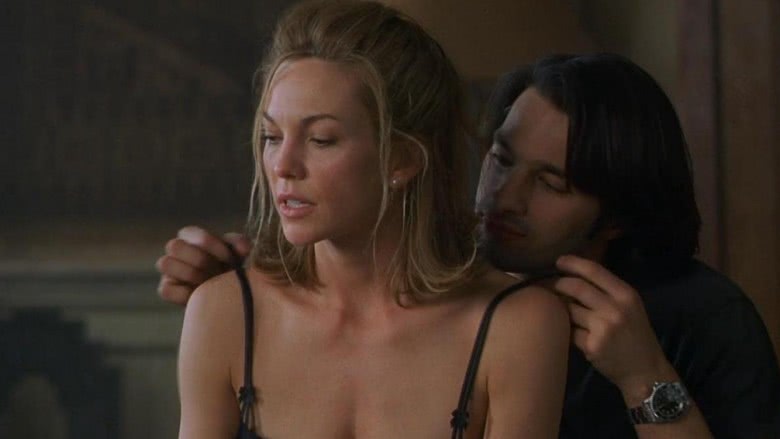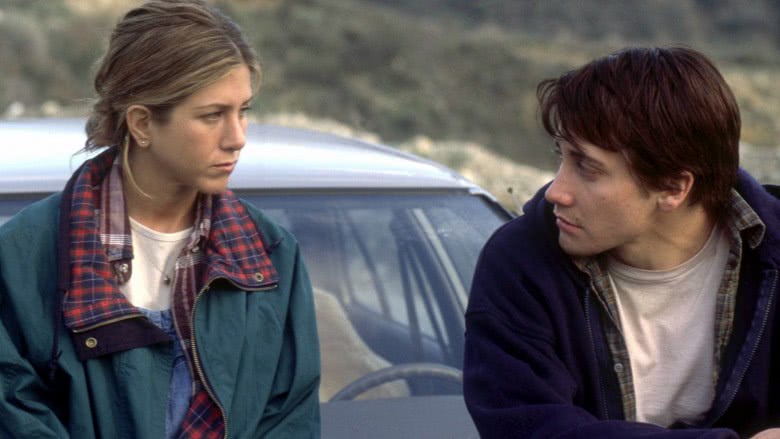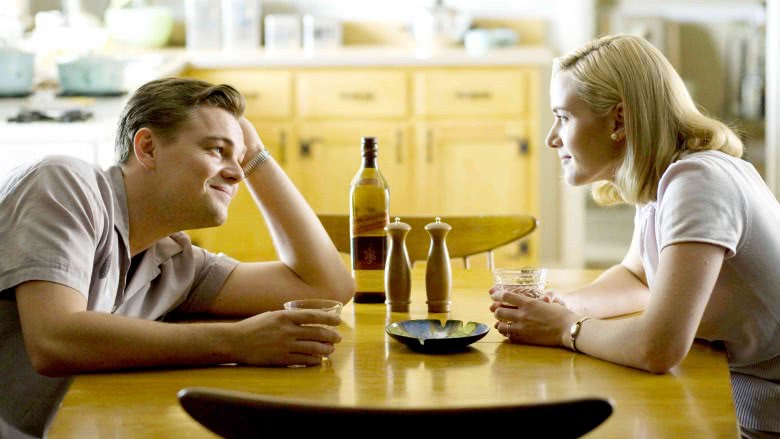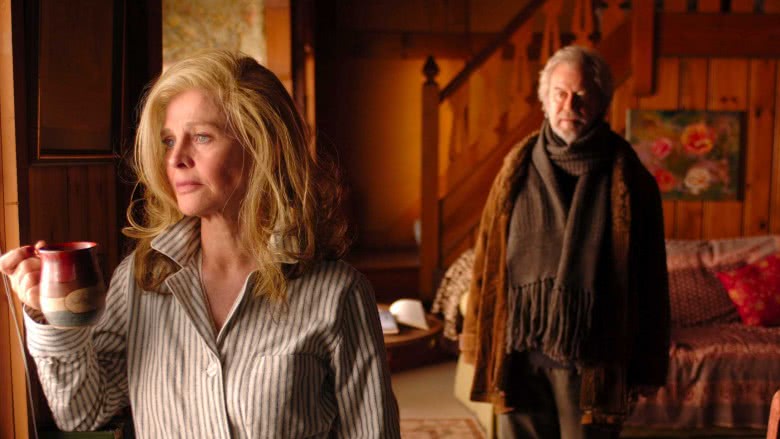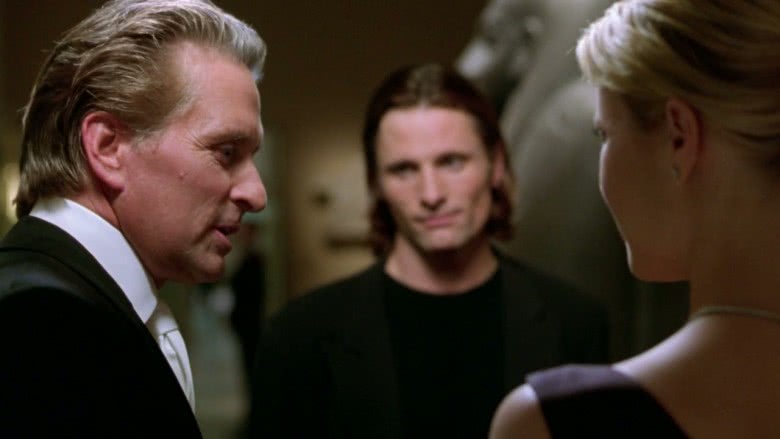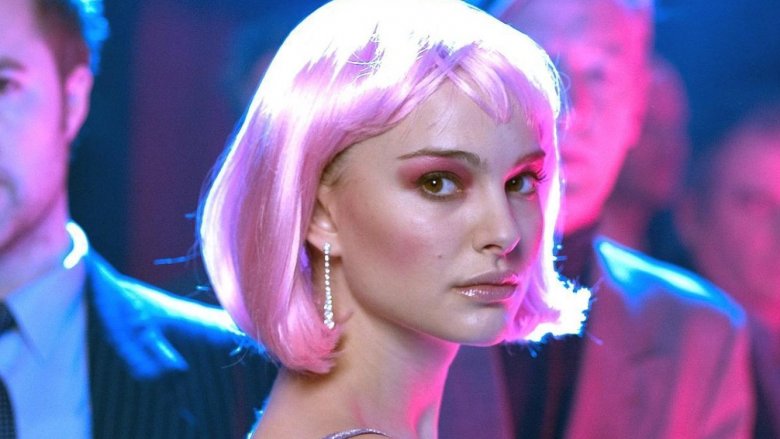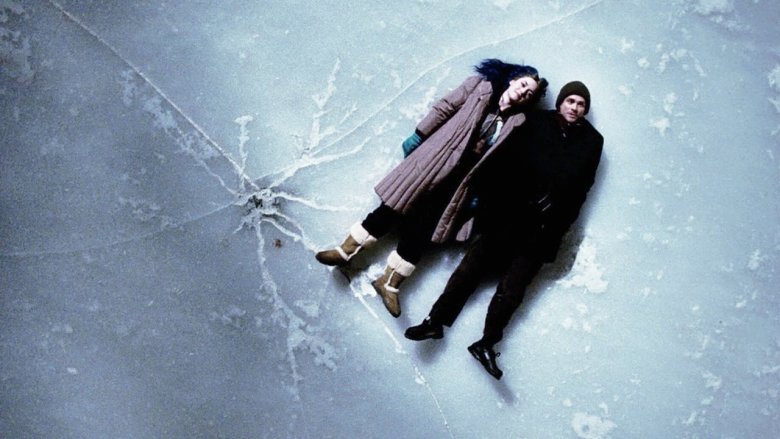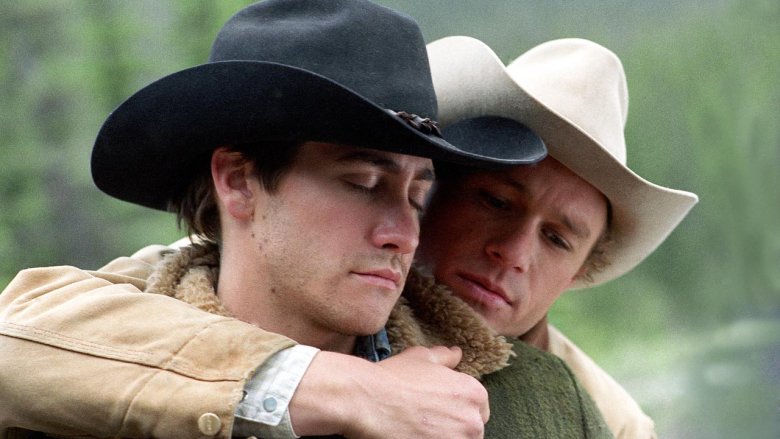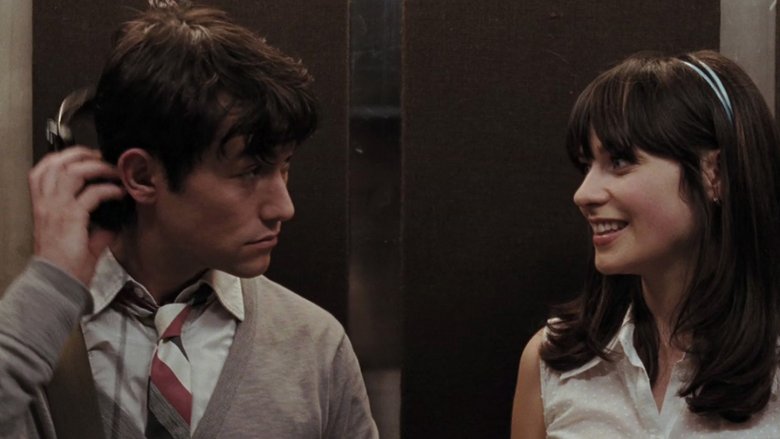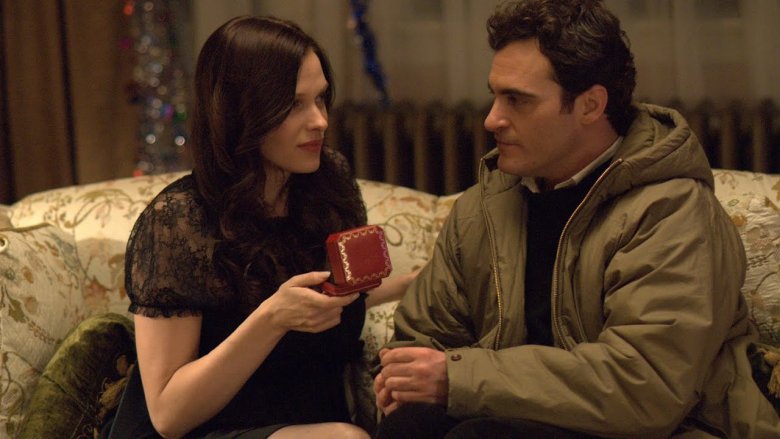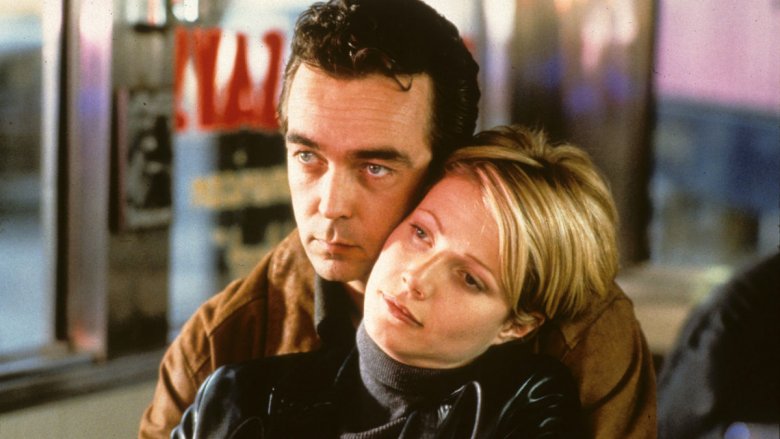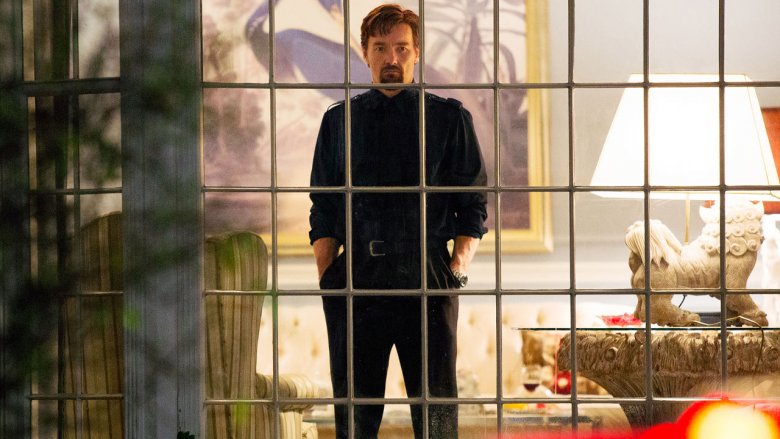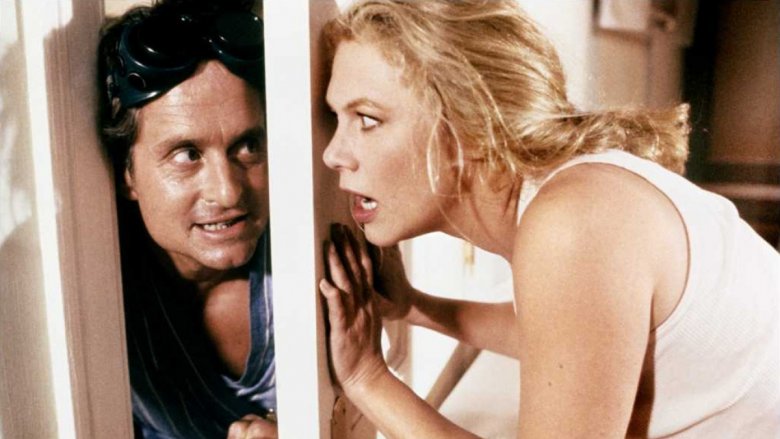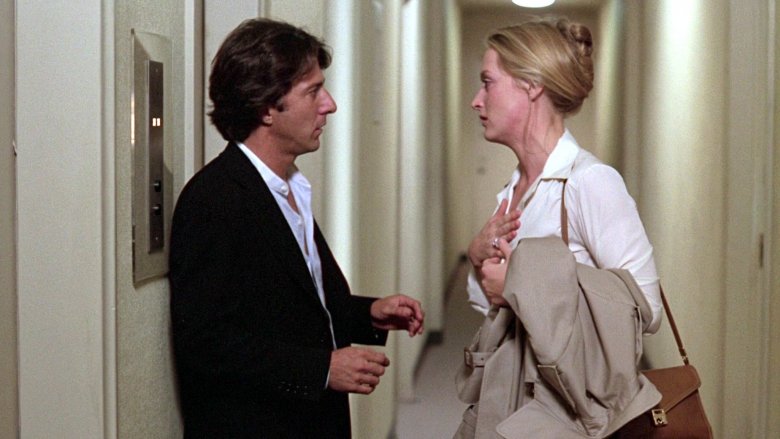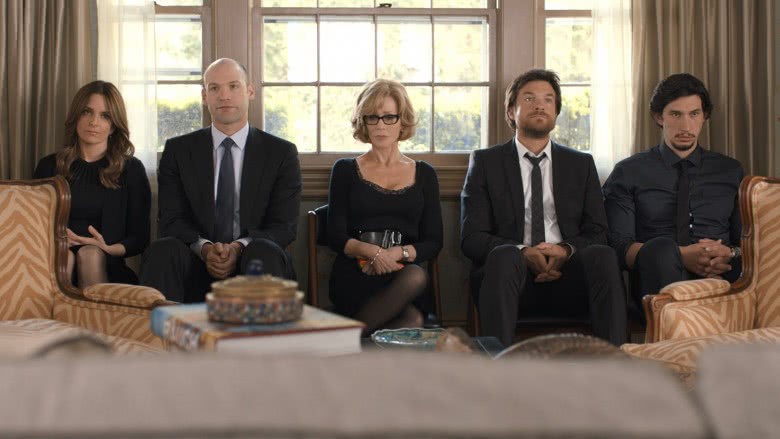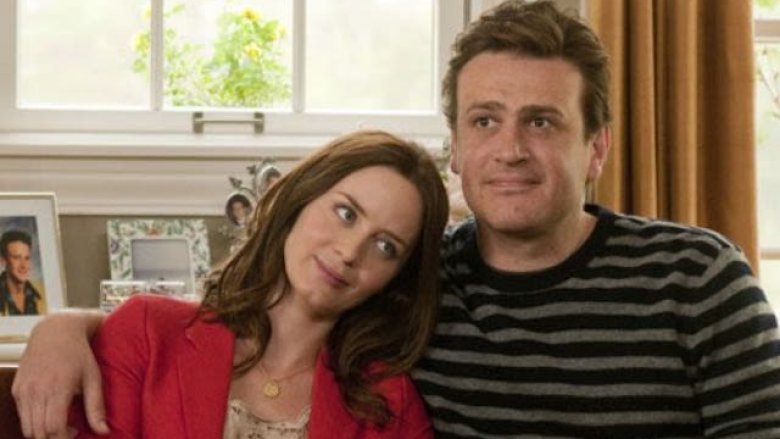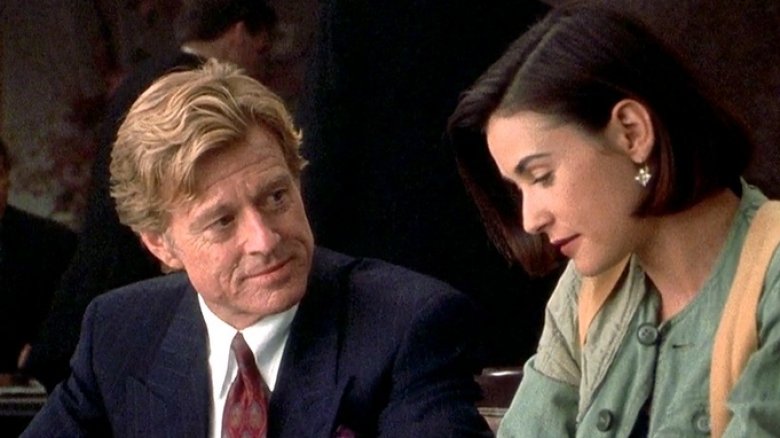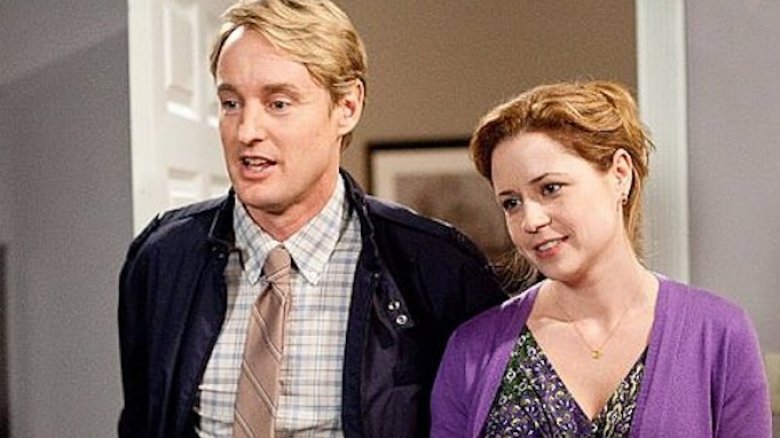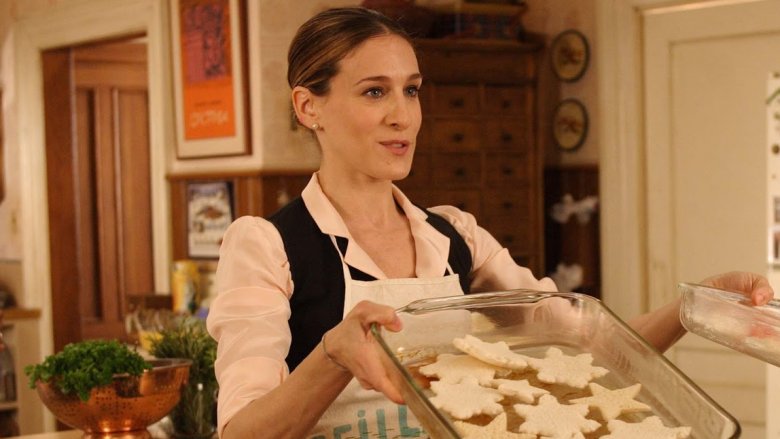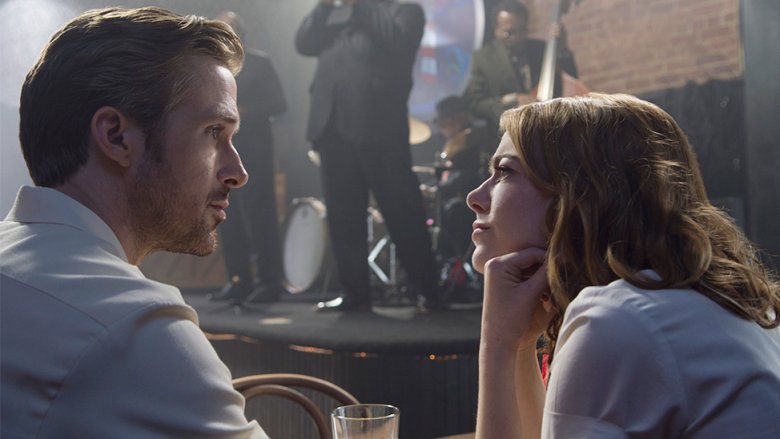Movies You Should Never Watch With Your Partner
When it comes to romance, watching a great movie can be the perfect way for couples to pass the time and get a little closer. They're entertaining, easily shared experiences, and they tend to teach us a thing or two about each other's tastes. Not only that, but movies can also be a great excuse to get cozy next to that special someone on the couch or love seat. You can't say the same for reading a magazine, right? No one ever got married after sharing a copy of Newsweek.
But some films, while they're great, are movies you should never watch with your partner. Why? Because you'll probably want to avoid arguments, general awkwardness, or even an air of sudden distrust. Nothing makes your sofa go from snuggle-central to the creepy zone quicker than these movies. The films on this list are totally worth your time...as long as you're by yourself.
Gone Girl
David Fincher's adaptation of Gillian Flynn's creepy mystery novel Gone Girl is the kind of movie that can easily leave a partner second-guessing what they really know about their partner, and the effect can be even worse when the film's watched with that person because, ya know, there's a more obvious correlation factor involved.
Chances are, your partner isn't plotting to fake his or her own death and frame you for it just out of spite. But given the graphic lengths to which Rosamund Pike's faux-from-the-start "Amazing Amy" character was willing to go to deliver payback to Ben Affleck's cheating Nick Dunne, it's just better to avoid the potential for romantic fallout that might result from sharing a viewing. That said, it's still totally worth a solo screening, because it's still a pretty solid adaptation of an intensely gripping narrative.
Sweet November
For a movie that was billed as a romantic drama, Sweet November sure has its twistier moments. The film centers around Charlize Theron's character Sara Deever who, at first, seems like your prototypically precocious manic pixie dream girl stereotype. But as Keanu Reeves' Mr. November, Nelson Moss, soon discovers, she has a lot more going on.
To help herself cope with her impending death from a terminal illness, Sara has spent her recent months making men's lives better with her very presence—an effort to "cure" them of whatever personality ailments they're suffering (yes, Freud would have a field day with this woman). She seems to fall hard and fast for Nelson, notwithstanding her hidden agenda, but her illness is already too far along for treatment, so he's left alone wandering around heartbroken.
For some, this might seem like a heart-wrenching story of star-crossed love, but for others, it might just be maddening that this poor schmuck could be duped into giving his heart to someone who completely concealed her illness. In the interest of avoiding unnecessary arguments on the homefront, avoid it with your significant other—but if you like a good old-fashioned weepie, this one totally deserves a solo screening.
Magic Mike
Depending on your romantic situation and shared tolerance for watching your partner salivate over the hip-thrusting action of impossibly attractive people, it might be best to steer clear of Magic Mike on date night. But even if you don't have an active interest in Channing Tatum's beefcake, it's still worth watching—much the same way some men justify their Playboy subscriptions by saying they read it for the articles, this Steven Soderbergh film is actually a solid, thought-provoking drama between the dance routines. Even so, it's best to not pull that thread together, unless you want to risk a long-winded jealous diatribe killing off your (or your partner's) banana hammock-induced buzz.
Unfaithful
Any attempt at even remotely discussing this movie is going to start an argument, guaranteed. Diane Lane's character Connie Summer is a married mother in a lustless marriage, but that all changes when she comes across Olivier Martinez's Paul Martel. The resulting affair is sensuous and intoxicating, especially to her, but has grave consequences for her marriage to Richard Gere's Charlie and her paramour. Without spoiling all of the details, let's just say that crimes of the heart aren't the only ones that result from her duplicity.
It's what happens next that's bound to be a point of severe derision from those who regard adultery to be the ultimate dealbreaker, so to avoid the inevitable conversational catastrophe that'll ensue from a shared screening of this movie, save it for a rainy day all by your lonesome (emphasis on the rainy—weather patterns are pretty important in this flick).
The Good Girl
Every Jennifer Aniston fan will want to see this movie. Much like her more recent acclaimed turn in the drama Cake, her work in The Good Girl marked an impressive departure from the generic rom-com fare she's been relegated to since her career-making turn as Rachel Green in Friends. That said, this one is also completely NSFC (Not Safe for Couples).
In short, the movie revolves around her store clerk character Justine Last being stuck in the rut of an emotionless marriage to husband Phil (John C. Reilly) until she's swept up by the unyielding attention of an exceedingly passionate and handsome co-worker, Jake Gyllenhaal's Holden Worther. The two engage in an affair, which culminates in a pregnancy—and she convinces Phil the baby's his. While some viewers might agree with Justine's decisions, others will disagree, given the dull and thoughtless way she's treated by her husband. The potential for post-credits squabbling looms large, so it's best to just steer clear of coupling up for this cinematic experience altogether.
Revolutionary Road
Kate Winslet and Leonardo DiCaprio made blockbuster magic together in Titanic—and their reunion a decade later for Revolutionary Road was nothing to shake a stick at either. The two play the Wheelers, a couple who share two kids and a run-of-the-mill '50s suburbanite existence but grow increasingly discontented with each other and their place in the world. They eventually decide to move to France, where she can be the breadwinner—but then she becomes pregnant with their third child, and everything falls apart.
What commences in this adaptation of the Richard Yates novel is a spectacular series of screen arguments that showcase the actors' gifts. At the same time, the movie's unblinking look at the irrevocable demise of a seemingly perfect couple can easily plant the seeds of doubt into even the most promising pair, so don't go queueing this one up on date night.
Away from Her
Sarah Polley's adaptation of the Alice Munro short story "The Bear Came over the Mountain" is a masterclass in many ways—from the exceptional script to the incredible acting by its lead stars, this grim drama is worth the watch. That said, it isn't likely to give couples a case of good vibrations.
A man who deeply loves his wife watches as her Alzheimer's washes away all memory of the life they shared, while she instead gives her heart to a fellow patient who suffers from a similar condition. Naturally, he tries to break them up by running interference, but he eventually finds that his wife's broken heart outweighs his own and, ultimately, surrenders to the two sharing their last days together. Needless to say, it's heartbreaking—and for any couple hoping they'll grow old together and die hand in hand The Notebook style, this might be a rude wake-up call that invites all kinds of ethical debates.
A Perfect Murder
There are so many layers of betrayal woven into the fabric of this film that it's hard to narrow down which is the worst. Is it Gwyneth Paltrow's character's saucy affair with the artist played by Viggo Mortensen, or is it Michael Douglas' character's deadly retaliation scheme? Is it the artist's willingness to play along, at the potential cost of his lover's life, or the husband's underlying greed that's fueling this whole thing?
No matter how you look at it, these people were all whacked in their own unique little ways and there were no true good guys or gals. That said, it's a totally fun '90s thriller-drama redux of Alfred Hitchcock's Dial M for Murder and is more than worth the rental fee—provided you go it alone so as to avoid the inevitable shifty discomfort that would come with watching this with someone you (think you) love and trust.
Closer
Betrayal is poison for relationships, and as Mike Nichols' Closer aims to prove, the consequences of deception tend to be pretty far-reaching. The film, adapted by Patrick Marber from his own play, is packed with entrancing performances by its quartet of leads — namely, Natalie Portman, Julia Roberts, Clive Owen, and Jude Law — whose characters become ensnared in love quadrangle that costs each of them dignity and happiness.
While it seems that the whole sticky situation is of one character's making, the ripple effect of that initial misdeed simply serves to expose the ills of everyone involved. Even the most confident of couples might experience a sowing of distrust after seeing how easily these characters devolve into such contemptible creatures. That said, the film still earns high marks for originality, the strong work of its cast, and a story that keeps the audience on its toes until the very end.
Eternal Sunshine of the Spotless Mind
Featuring career-best work from Jim Carrey and Kate Winslet, Eternal Sunshine of the Spotless Mind was an instant classic. Combining a novel concept, some unexpected moments of visual dynamism, and a lot of heart, it's a treat for cinephiles and shouldn't be missed.
That said, it goes completely nuclear on the concept of a happy ending and probably isn't great viewing for ostensibly happy couples. The film centers on a pair of exes who decide to have their memories erased instead of trying to live through their heartbreak. About halfway through the procedure, though, one begins to realize how precious those moments are to him, even the hardest ones, and he tries to fight back the sweeping elimination in progress. It's a somber story that, while hopeful in parts, is sure to darken anyone's understanding of love — and give modern life to those old poetic sentiments about the value of a love lost.
Brokeback Mountain
Brokeback Mountain is a staggeringly beautiful film and a must-see for all movie lovers ... but it's also best reserved for a solo viewing. For one thing, it's about as heart-wrenching as it gets to watch two people who are so miserably in love with one another be perpetually separated by social barriers, only to realize the harrowing truth that, in the end, society will leave you lonely anyway. Its ending is a major bummer that's bound to spoil any kind of date night, even if its principal romance is truly touching.
It's also one of those films that you may never want to hear someone else's opinion of, let alone a mid-screening hot take. The aching performances of Heath Ledger and Jake Gyllenhaal, along with Michelle Williams and Anne Hathaway, feel incredibly personal and are best served to an audience of one, unless you know for sure your significant other will say just the right thing after the credits roll.
(500) Days of Summer
The bitter truth about breakups is that it's not always mutual. Sometimes, someone decides it's over and the other is completely blindsided by the decision, having spent the period of apparent deterioration in a haze of happiness the other party didn't share. In (500) Days of Summer, the central couple, portrayed by Joseph Gordon-Levitt and Zooey Deschanel, could not be cuter together, which makes his misunderstanding that this is the real deal quite relatable.
Even worse, as he attempts to reconcile his own feelings with the facts of their time spent together, he has to confront the stunning reality of how quickly and quietly she's able to move on from what they had together. Thanks to some visionary direction choices by Marc Webb and solid thespian showcases, the film certainly lives up to all the hype that followed its Sundance Film Festival debut. For any couple who's convinced they've got forever ahead, however, it might serve as an unwelcome wake-up call.
Blue Valentine
Derek Cianfrance's debut film Blue Valentine is bound to put a damper on any happy couple's optimism for eternal bliss. The film completely hinges on the stellar (and sad) performances of leads Michelle Williams and Ryan Gosling, who star as a pair who fall for each other fast and make a big commitment right away. Their romance is quirky and sweet at first, with ukulele street dances and promises of forever and all the trappings of young love. In time, though, relationship fatigue begins to set in, and the two start dropping pretenses and getting down to the reality of their significant differences.
This culminates in a bleak, disappointing spectacle that's hard to endure in any setting, let alone while seated next to a romantic partner with whom one would not like life to imitate this art. Thanks to the devastating work of the director and central stars, though, it's a good one to lean on for a sincere cry session if and when the mood strikes.
Two Lovers
No one wants to settle when it comes to long-term romance, but sometimes circumstances can get in the way of a happy ending. Such is the case for Joaquin Phoenix's character in Two Lovers, who has to break off an engagement due to a genetic condition both partners share which could severely harm any children they might bear. That loss cripples him emotionally to the point that when his parents set him up with a potential match, he pretty much phones it in with the poor woman.
His heart does get involved, however, when a third woman comes into the picture and throws his parents' plans off course. As fiery as their connection may be, practical considerations hold him back, and it's hard to watch the inevitable end unfold. Anyone who's wondered whether they may be in a relationship of convenience could be especially curious after sitting shoulder to shoulder with a significant other during this glum drama.
Sliding Doors
Time may be a flat circle, per the philosopher Nietzsche, but that doesn't mean the lines don't squiggle in and out of place every now and again. This drama film centers on a woman, played by Gwyneth Paltrow, who experiences two different versions of reality: one informed by her missing a train and thusly failing to catch her boyfriend in the act of cheating on her, and other featuring her discovering the deed and acting accordingly. Each version of the story features individual pains with moments of parallelism that makes the storytelling that much more compelling.
It's also a difficult and dour film, though, and anyone watching it is simply bound to wonder whether they've ever missed their own proverbial train. Like many of these movies, couples who catch it together might be tempted to start questioning their own contentment, raising potential disagreements and discord that can be avoided altogether by opting out of taking it in as a twosome.
The Gift
With The Gift, Joel Edgerton proved his talents extend well beyond a strong screen presence. The accomplished actor made his writer-directorial debut with this eerie mystery-thriller and pulled off one of the most satisfying—and unsettlingly ambiguous—endings in the entire genre.
As Gordo, a man who shares a mysterious past with Jason Bateman's character, Edgerton lingers disquietingly at the margins of everything his old acquaintance has built for himself—a great job, a beautiful wife and home, and even the possibility of a growing family. The titular "gift" can be seen in several different ways during the movie, but perhaps the movie's most lasting effect is the gnawing sensation it leaves you with. Questions like "Who was right?," "Does one crime justify another?," and perhaps most dangerously for couples, "What would I have done in this situation?" are bound to pop up after letting this mindtrip of a movie sink in.
War of the Roses
Breakups are almost always messy, but The War of the Roses is next-level matrimonial wreckage. The third of Kathleen Turner and Michael Douglas' film collaborations, the film features the pair as a bitterly estranged couple who try to force one another out of their shared home, and things get more and more vicious as their unrestrained hatred grows.
Sure, there are hilarious moments and epic one-liners, but for anyone on the cusp of marriage (or divorce), it's bound to give audiences the same kind of pause that Funny Farm might have for prospective homebuyers and/or National Lampoon's Vacation did for that upcoming trip to an amusement park. Not only that, but the chances of an argument over which of the leads is most deserving of his or her physical punishment is higher after a shared screening. It's probably best to go it alone; after all, viewers wouldn't want to derive any big ideas from the title couple.
Kramer vs. Kramer
There's a reason this movie won a whopping five Oscars, including best acting trophies for Meryl Streep and Dustin Hoffman; it's a gutting story and still holds up. As the title indicates, the movie centers on a divorcing couple's courtroom battle over custody rights to their son, and the nerves exposed by the picture are about as raw as they can possibly be.
Perhaps it's the fact that there's a child's welfare and happiness at the center, or the all-too-common bitterness being exchanged by his parents, but there's something very disarming about the conflicts contained in the movie. It's a master class of acting, of course, so anyone who loves to watch stars dig into their craft should see it. Yet it probably isn't the kind of film you want to watch with your spouse — it might feel more like a cautionary tale than a mere movie experience.
This Is Where I Leave You
In this movie, there's a guy who catches his wife bedding his boss in their bed and boom, finds out she's pregnant with the baby they'd been trying to conceive for years. Then there's a woman who sneaks off with her mentally handicapped next-door neighbor. There's also a guy dating his therapist, who's at least twice his age. And then there's the woman who tries to seduce her brother-in-law to score some of his sperm since her husband's shooting lazy swimmers. And that's just the tip of the iceberg, really.
The toxicity of this fictional family is so wild that there's literally a chart that explains all the warped connections, so someone's just gotta disagree with the characters' choices after watching the movie. The drama is truly out of control, and the potential for personal disagreements is at full-tilt too. Just do yourself a favor and check it out during some alone time.
The Five-Year Engagement
Couples experiencing commitment issues, or couples for whom the fact that they're not yet married looms like a dark cloud, this is not the movie for you. The Five-Year Engagement, co-written by star Jason Segel, isn't so much a romantic comedy as it is a bleak comedy about how long-term relationships are extremely hard to maintain with each person's identity intact... so, not quite Netflix-and-chill material.
Things are going along smoothly for Tom (Segel) and Violet (Emily Blunt) — until they get engaged and their perfect wedding gets delayed when Violent is accepted into a two-year post-doc program in Michigan, meaning Tom has to uproot his career as a rising star in San Francisco's high-end culinary scene. Violet excels in her program, which gets extended, while Tom becomes withdrawn, resentful, and petulant. The viewers wonder why Violet still wants to marry Tom, but it's fine because their marriage keeps getting delayed by life. It's kind of a relief when they inevitably (but briefly) break up. Ah, young love!
Indecent Proposal
Prepare to question your relationship after watching this heartbreaking story about how love does not always conquer all. David (Woody Harrelson) and Diana (Demi Moore) have been together since high school, and are looking to take the next step together in life financially with a big real estate project. Hoping to secure the funds quickly, they take their life savings to Las Vegas... and lose it all on roulette. But they do meet a smirking rich guy named John Gage (Robert Redford), so taken by Diana that he crudely offers the couple a million bucks to spend the night with her.
They talk for hours about the deal and its effect on their marriage, which is exactly what countless couples did in 1993 when this movie became a cultural phenomenon. After all, that is life-changing money, and couples are a "team" and all that, even if it was a flagrant rejection of wedding vows. (These are uncomfortable topics to broach for the characters in Indecent Proposal — and for anyone who watches Indecent Proposal, in 1993 or now.) Well, they agree to the plan: Diana sleeps with John Gage, a million bucks changes hands, and the once-happy couple tries to get on with their lives except David can't, consumed with jealousy and suspicion that the other two sides of this messed-up love triangle are still seeing each other. What a fun, sexy movie about a marriage strained to its breaking point!
Hall Pass
Men, women, and the concept of relationships all fail to get a fair shake in Hall Pass, the 2011 comedy that explores the extremely tired and sexist tropes that men want sex all the time with everybody and women don't (and if they do, they shouldn't). Rick (Owen Wilson) and Fred (Jason Sudeikis) are best friends married to Maggie (Jenna Fischer) and Grace (Christina Applegate), respectively. But as they're a couple of dude-bros facing midlife and long for their carefree, immature bachelor days, their wives give them the titular "hall pass," or rather a week's worth of permission to go bed other women. The most notable things that occur during this swingin' week: Grace beds down with a guy and feels so guilty about it that she crashes her car, and Rick almost hooks up with his children's babysitter (Alexandra Daddario), who has only just turned 21.
Hall Pass could open up a dialogue about all sorts of stuff that couples don't want to talk about, let alone think about: unhappy partners, sexual disappointment, and what dudes are thinking about when they look at the babysitter. Some viewers may wonder if their guy wants a "hall pass," and their partners might think that they need one.
The Family Stone
Promotional materials might leave audiences thinking that this film from 2005 is a gender-reversed Meet the Parents clone. The basic premise: Everett Stone (Dermot Mulroney) takes his new girlfriend Meredith (Sarah Jessica Parker) home for Christmas, both to meet his large family and to propose with his grandmother's ring. Holiday movie wackiness and Meredith trying too hard to win the Stones' approval doesn't happen, because The Family Stone is just not that movie.
Meredith is extremely uptight and behaves awkwardly in this universally awkward situation, and the Stones smell blood, behaving openly hostile and downright mean to this woman a member of their family wishes to marry. If couples watching at home have any sort of in-law issues, The Family Stone makes for uncomfortable viewing. And that's not even counting the added layer of melodrama. Matriarch Sybil Stone (Diane Keaton) is dying, and this is probably her last Christmas and one of the few times she'll see her whole family together again. Much of that emotional burden gets heaved at Meredith, who tries to find solace by calling in her sister Julie (Clare Danes) to the Stones' holiday celebration, which invites some weird couple-swapping — Meredith winds up with Ben Stone (Luke Wilson) and Julie gets together with Everett. So on top of everything else The Family Stone forces unsuspecting viewers to field, they might be left wondering if their partners think their siblings are attractive.
La La Land
There's a little something for everyone in La La Land. It's got ambitious and athletic musical numbers, cool jazz club scenes, and eye candy in both Ryan Gosling and Emma Stone, who share an intense onscreen chemistry. There's comedy, there's drama, there are special effects. But just because it's a movie about love, and a movie musical about love, doesn't mean the couple winds up together. The film finds Sebastian (Gosling) and Mia (Stone) as a pair forging a relationship while they each try to fulfill their lofty creative dreams — he as a jazz pianist, she as an actress — and they wind up choosing their passion for their art over one another. That's a profound and shocking statement about love, especially for a romantic movie, that the need to make art can supersede it. But for a couple watching at home, that may invite some awkward thoughts or post-movie questions: What might each member of this relationship choose over love, for example, and would they, if given half the chance?
The film's ending opens up to an even larger psychological minefield. Because Sebastian and Mia — clearly soulmates — split and wind up with other partners (Mia, at least; she marries some guy), couples at home may be left wondering if that person on the couch next to them is reminded by La La Land of "the one who got away."
